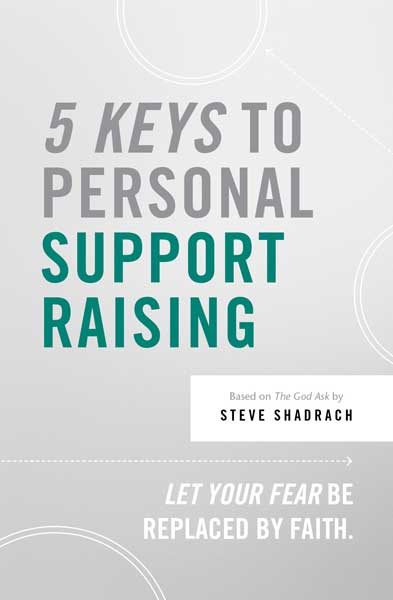
For almost a full year we’ve worked on painting and remodeling our house to get it ready to sell. Then my wife creatively “staged” the house so people could visualize living here. It worked! The house sold to the very first person who looked at it. The next few weeks will be a blur as we find a new place to live, pack, and a myriad of other tasks. Moving produces significant stress and can take our eyes off of the Lord. Being in ministry has a way of producing anxiety and stress in our lives too, doesn’t it? Especially when it comes to raising support! Pastor and author, Alistair Begg got my attention when he wrote: “If you cannot trust God with the physical, how dare you trust Him with the spiritual? Can you trust Him for your soul’s redemption, and yet not rely upon Him for a few lesser mercies? Is God not enough for your need, or is His all-sufficiency too narrow for your wants?” So, we can trust God for our salvation, for the eternal destiny of our souls, but we struggle with trusting Him with the much easier physical things in life—such as His provision for us?
Have you ever wondered how Paul seemed so calm in the midst of all the difficulties he experienced? His circumstances were far from ideal. Paul was in prison when he wrote a missionary letter to the Philippians, his prayer and financial partners. Even though under house arrest, you can almost feel the incredible sense of peace he possessed. How was he able to overcome the temptation to be anxious about what would happen to him or from where his next meal would come? Here’s his secret in 4:10-13, “I am not saying this because I am in need, for I have learned to be content whatever the circumstances. I know what it is to be in need, and I know what it is to have plenty. I have learned the secret of being content in any and every situation, whether well fed or hungry, whether living in plenty or in want. I can do all this through Him who gives me strength.”
Although the great apostle was being unfairly detained and deprived, he learned to be content, whether he had much or had little. He says it three times! Even though he was humanly dependent upon others to provide food and his other physical needs, he was content, that God behind the scenes, was the provider. Personally, being locked up and at the mercies of my captors, it would have been agony for me to trust God, and experience contentment through it all! But Paul’s unwavering confidence in God’s provision grew out of his intimate relationship with the Savior who rescued him from his sin.
People often take the popular Philippians 4:13 out of context when they pray for God to give them strength for some impending task. When Paul says, “I can do all things through Him who gives me strength”, those “things” refers back to his ability to be content with God’s provision, whether well fed or hungry. His strength to believe came out of his intimate knowledge of God. He is the one who gave Paul the strength to be content with how much or how little He provided. And when Paul encouraged the Philippians with, “And my God will meet all your needs according to the riches of his glory in Christ Jesus,” he did this out of his profound understanding of God’s gracious and faithful character.
Where did Paul learn this kind of contentment? How did he experience peace in the midst of excruciating turmoil? Earlier in that same chapter (verses 6-8) Paul reveals his two step plan when things got tough:
- He turned to God in prayer
“Do not be anxious about anything, but in every situation, by prayer and petition, with thanksgiving, present your requests to God.” The result is, “And the peace of God, which transcends all understanding, will guard your hearts and minds in Christ Jesus.”
- He filled his mind with the good, not the bad
“… whatever is true, whatever is noble, whatever is right, whatever is pure, whatever is lovely, whatever is admirable—if anything is excellent or praiseworthy—think about such things.” Paul knew what to dwell upon. He was smiling at his future, not cursing it. That attitude shaped his understanding of God’s character.
The faith to trust God to provide your support must come out of a profound understanding of your personal relationship with Him and that He will save you. And as your relationship with the Lord deepens, so should your ability to trust Him to provide your support.
I often tell our staff, “If you cannot trust God for your daily bread, then do not tell me you can trust Him for the fulfillment of the Great Commission.” When we trust Him for the work of our salvation, we gain confidence to believe He will also provide for us. It’s insane to think trusting God to raise our support would be more difficult than trusting Him for our salvation! Nor should we make raising support more difficult than giving every man, woman, and child on the planet the opportunity to hear about Jesus.

